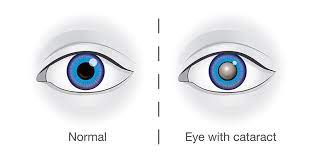
Cataract Symptoms
Have you ever peeped out of a foggy window? What did you see? Hazy visuals of the objects outside the window. Right? This is exactly what people with cataracts see every day. A cataract is a common vision problem in which your eye lens looks and feels cloudy.
If you are living the golden days of your late 50s, cataracts may hinder this phase of your life. It is a common eye problem that makes it difficult to read, drive a car at night, or see things clearly around you.
Some cataracts develop gradually and don’t affect your vision in the early stages. Over time, it may cause permanent blindness if not treated timely.
Let’s discuss the types of eye cataracts, signs, symptoms, causes, risk factors, and treatment options.
What are the types of Cataracts?
There are different types of cataracts, and they differ based on the part of the eye and the way it affects your vision:
- Nuclear Cataract
This type of eye cataract affects the centre of your eye lens and causes it to turn yellow or brown. Initially, you may get near-sightedness (myopia) and may feel temporary ease in reading. Later, your eye lens gets denser, clouding your vision. When a cataract progresses, it becomes difficult for you to distinguish between varying shades of colours.
- Cortical Cataract
Itdevelops in the edges of your eye lens. It starts from the edges of your eye lens and grows as you age. When it sets completely, the cloudy streaks reach the centre and affect the light entering through your eye lens.
- Posterior Subcapsular Cataract
When there is opacity at the back of your eye lens in the path of light, it is called a posterior subcapsular cataract. People with this vision condition have difficulty reading and lower vision in bright light.
- Congenital Cataract
If you have a cloudy vision at birth or developed it during your childhood, it indicates congenital cataracts. The reason may be genetic or associated with an intrauterine infection or trauma affecting one or both of your eyes.
What are the Signs of Cataracts?
Signs and symptoms of cataracts may not be observed in the initial stages when it is mild. So, here are some symptoms:
- Sensitivity to light and glare
- Blurry vision
- Increasing vision difficulty at night
- Frequent eyeglass or contact lens prescription changes
- Fading of colours
- Double vision in a single eye
With the onset of cataracts, the blurriness in your vision may only affect a minor part of your eye lens. At this stage, you might not have any idea about vision loss, but when it increases, it covers a larger area of your eye lens, impacting the path of light and causing notable symptoms.
If you observe severe difficulty, you can reach out to Dr Agarwals Eye Hospital for an instant check-up of your eyes and get the best treatment.
What are the Causes and Risk Factors of Cataracts?
A cataract is an age-related vision problem, and as you age, normal eye changes impact your vision. Here are its causes:
- Breakage of proteins and fibres in your eye lens
- Inherited genetic disorders
- Steroid medications
- Eye injury or inflammation
- Obesity
- Smoking
- Underlying health problems like diabetes and high blood pressure
- Certain eye diseases, like retina pigmentosa or uveitis
The factors mentioned above trigger cataracts in your eyes. It worsens your eye problems if not treated on time.
How Do You Manage Cataracts?
If you are on any medications that impede your vision ability, contact your eye doctor at the earliest. This helps you reduce the symptoms significantly. Furthermore, here are two options that doctors prefer to lower root out its symptoms:
- Contact Lenses or Eyeglasses
Eyeglasses are effective for treating it in the initial stages. Your eye specialists conduct eye tests and understand your vision ability. This helps them recommend the best eyeglasses.
- Surgery
Since cataract creates hindrances in your life to perform even simple tasks, it is essential to eliminate them.Cataractsurgery is a proven and effective way to remove cataracts from your eyes and restore your normal vision.
In this surgery, eye specialists remove the clouded eye lens and place an intraocular lens (IOL). After this surgery, you restore your vision completely and see the world around you.
Cataractis a common and increasing eye problem, being the primary cause of blindness. If you observe eye cataract symptoms like blurry vision, light sensitivity, or fading of colours, call your doctor or visit Dr Agarwals Eye Hospital. To alleviate cataract signs and symptoms, doctors perform surgery.
When you visit Dr Agarwals Eye Hospital for surgery, their experts thoroughly examine your eyes, studying your medical history and other essential parameters. Moreover, they provide self-care tips for fast recovery. So, book your appointment today!
Write and Win: Participate in Creative writing Contest & International Essay Contest and win fabulous prizes.


